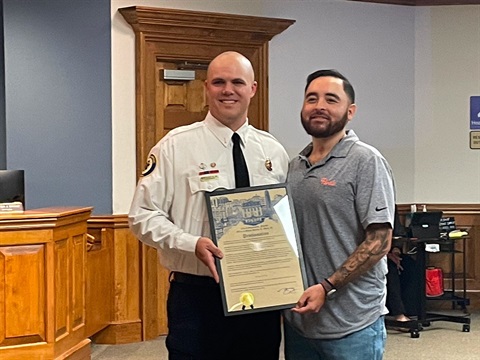Celebrating first responders during National EMS Week
Published on May 22, 2024

By Rossana Passaniti
When Gainesville Fire Rescue (GFR) paramedics first arrived at the scene of the motorcycle accident, the young, helmetless rider was unconscious. Matt Benavidez, a senior in college, had suffered life-threatening injuries in a collision with a vehicle on that fateful night in November 2020.
First responders, working under the glow of headlights and flashlights, relied on their extensive training to quickly assess and treat their patient. Benavidez wasn’t breathing and they’d need to perform an emergency surgical procedure out in the field – a cricothyrotomy.
“We constantly do repetitions on that particular skill,” explained Lt. Johnny Kalaf who’s treated many injuries in his 13 years as a licensed paramedic but had never done a “surgical cric” until that call. Kalaf located the precise spot on the neck for the incision, made an opening into the trachea and inserted the breathing tube so Benavidez could breathe again.
“I was in the best position, relative to the patient…right place, right time,” said Kalaf. While he has not performed the procedure on a patient since, he remains prepared in the event his skills again are required. They may be.
In Gainesville, most calls to GFR are not requests for service to extinguish blazes. In fact, 75 percent are calls for medical assistance.
“It’s the bulk of what our firefighter/paramedics and firefighter/EMTs do,” said Gainesville Fire Rescue Chief Joseph Dixon. “They are highly trained, highly skilled teams capable of providing emergency medical services (EMS) on-site, all the way up to the advanced life-support level,” he said.
Nationally, approximately 80 to 85 percent of calls to which fire departments respond are not fire-related.
On this 50th anniversary of National EMS Week (May 19-25), communities across the country recognize the accomplishments of the dedicated public health professionals who serve their communities on the frontlines of healthcare. For Matt Benavidez, he is grateful to Kalaf and fellow paramedics, and all the medical professionals who saved his life and restored his health.
After several days in a coma and two months in intensive care at University of Florida Health, followed by speech, physical and occupational therapy, Benavidez made an almost-complete recovery in just three months. Nine months to the day after his accident, he graduated from UF. Today, he is studying to apply to medical school with hopes of becoming a trauma surgeon like the one who treated him after the accident.
“I’m blessed,” said Benavidez. “It’s my duty to give back and save as many lives as possible.”